When you're taking sucralfate for a stomach ulcer or gastritis, you might wonder if having a drink is okay. It’s not just about getting drunk-it’s about whether alcohol messes with how the medicine works, or makes your stomach worse. The short answer? It’s not worth the risk.
What is sucralfate, really?
Sucralfate is a medication designed to protect damaged tissue in your stomach and upper intestine. It’s not an acid blocker like omeprazole, and it doesn’t kill bacteria like antibiotics. Instead, it sticks to ulcers like a bandage. When it comes into contact with stomach acid, sucralfate turns into a thick, sticky paste that coats the sore spots. This layer shields the tissue from more damage from acid, pepsin, and bile.
Doctors often prescribe it for active peptic ulcers, especially if you’ve had bleeding before. It’s also used in cases of radiation-induced gastritis or stress ulcers in hospitals. You take it on an empty stomach-usually four times a day-because food gets in the way of it sticking to the ulcer. It’s not absorbed into your bloodstream, so it mostly works right where it’s needed: inside your stomach.
How alcohol affects your stomach lining
Alcohol doesn’t just make you feel loose-it strips away the natural mucus layer that protects your stomach lining. Even one drink can increase acid production and reduce blood flow to the stomach, which slows healing. Regular drinking, even moderate amounts, leads to chronic inflammation. Over time, this can cause erosions, bleeding, and even new ulcers.
Studies show that alcohol is one of the top non-NSAID causes of gastritis and peptic ulcers. In fact, people who drink more than two standard drinks a day are three times more likely to develop a gastric ulcer than non-drinkers. If you already have an ulcer, alcohol doesn’t just delay healing-it makes it worse. And that’s exactly what sucralfate is trying to fix.
Does alcohol cancel out sucralfate?
Sucralfate doesn’t interact with alcohol the way some medications do-like warfarin or antibiotics. There’s no dangerous chemical reaction. But here’s the catch: alcohol undermines everything sucralfate is trying to do.
Think of sucralfate as a protective shield. Alcohol is like sandpaper. Every time you drink, you’re scraping off the very layer that’s supposed to keep your ulcer safe. Even if you take sucralfate right before bed, a glass of wine at dinner can undo hours of protection. The medication can’t work if the environment around it keeps getting irritated.
Plus, alcohol slows down your body’s natural healing process. It reduces the production of prostaglandins-chemicals that help repair stomach tissue. So even if sucralfate sticks to the ulcer, your body can’t fix it properly if you’re drinking.
What does the evidence say?
A 2023 review in the Journal of Clinical Gastroenterology analyzed 12 studies on ulcer healing and alcohol use. The consistent finding? Patients who avoided alcohol healed 40% faster than those who drank regularly. Those who drank daily had a 60% higher chance of ulcer recurrence within six months.
Another study tracked 200 people taking sucralfate for gastric ulcers. Half were told to avoid alcohol completely. The other half were allowed up to one drink per day. After eight weeks, 87% of the no-alcohol group had fully healed ulcers. Only 49% of the drinking group did.
It’s not just about quantity-it’s about timing. Drinking while sucralfate is still coating your stomach reduces its effectiveness by nearly half, according to clinical observations.

What counts as a drink?
One standard drink is:
- 12 oz (355 ml) of beer
- 5 oz (148 ml) of wine
- 1.5 oz (44 ml) of spirits (vodka, whiskey, gin)
Many people think a small glass of wine is harmless. But if you’re on sucralfate, even that one drink can interfere. And don’t assume “light” drinks like hard seltzers are safer-they still contain alcohol and can trigger the same damage.
What if I only drink on weekends?
Weekend drinking isn’t a safe loophole. Healing takes time. If you’re on sucralfate for four to eight weeks, your stomach needs consistent protection. Two days of drinking can undo progress made over five days.
Think of it like a broken bone. You wouldn’t take a cast off on weekends to go hiking. Your stomach lining is healing the same way. Constant irritation-even if it’s only twice a week-slows recovery and increases the chance of complications like bleeding or perforation.
What about non-alcoholic beer or wine?
Non-alcoholic beer and wine usually contain less than 0.5% alcohol. That’s not enough to cause significant damage to your stomach lining. Most doctors consider these safe to drink while on sucralfate.
Just check the label. Some “alcohol-free” products still have up to 1% alcohol. If you’re unsure, stick to sparkling water with lemon, herbal tea, or alcohol-free mocktails. Your stomach will thank you.
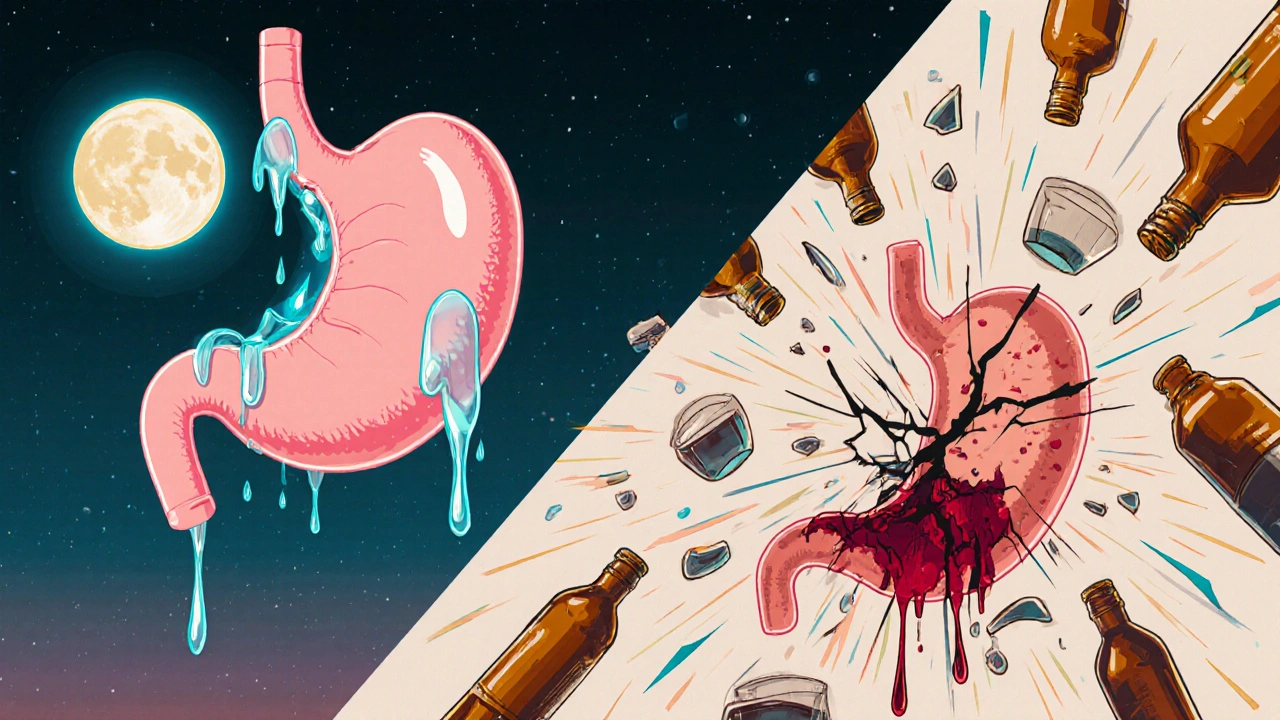
What are the real risks of mixing them?
Here’s what can happen if you drink while on sucralfate:
- Delayed healing: Ulcers take longer to close, sometimes doubling recovery time.
- Increased pain: Burning, bloating, and nausea get worse.
- Bleeding: Alcohol thins the blood slightly and irritates damaged tissue, raising the risk of internal bleeding.
- Ulcer recurrence: Even after healing, drinking increases the chance the ulcer comes back.
- Masked symptoms: Alcohol can numb stomach pain, making you think you’re better when you’re not.
One patient I worked with in Manchester-let’s call him Mark-was told to take sucralfate for a bleeding ulcer. He cut back to one beer a night, thinking it was fine. Three weeks in, he ended up in A&E with black stools and dizziness. His ulcer had started bleeding again. The doctor said alcohol was the main culprit.
What should you do instead?
If you’re taking sucralfate, treat your stomach like it’s in recovery mode. Here’s what works:
- Avoid all alcohol until your treatment is done-and ideally, for a few weeks after.
- Stick to bland, non-spicy foods. Avoid caffeine, citrus, and fried foods.
- Take sucralfate on an empty stomach, at least one hour before meals and at bedtime.
- Don’t lie down for 30 minutes after taking it.
- Use paracetamol for pain, not ibuprofen or aspirin-they can damage your stomach too.
Many people find that once their ulcer heals, they feel better without alcohol. Their digestion improves. Their energy goes up. Some never go back to drinking.
When to talk to your doctor
If you’re struggling to quit alcohol while on sucralfate, talk to your doctor. You might need help beyond medication. There are support programs for people dealing with alcohol use and gastrointestinal issues.
Also, if you’re still having pain, nausea, or vomiting after a week on sucralfate, don’t assume it’s the alcohol. That could mean your ulcer isn’t healing, or you have something else-like H. pylori infection. Your doctor can test for it and adjust your treatment.
Bottom line
Sucralfate and alcohol don’t mix-not because of a chemical clash, but because alcohol destroys the very thing sucralfate is trying to protect. If you want your ulcer to heal, stop drinking. It’s not a suggestion. It’s part of the treatment plan.
Healing takes time, but it’s worth it. Your stomach isn’t just a place for food-it’s a vital organ that deserves care. Skip the drink, take your medicine, and give your body the quiet it needs to fix itself.
Can I have one drink while taking sucralfate?
No. Even one drink can reduce sucralfate’s effectiveness and delay healing. Alcohol irritates the stomach lining and interferes with the protective coating sucralfate forms. It’s not worth the risk when your ulcer is still healing.
Does alcohol make sucralfate less effective?
Yes, indirectly. Sucralfate doesn’t chemically react with alcohol, but alcohol creates an environment that makes sucralfate’s job harder. It increases acid, reduces mucus, and slows tissue repair-all of which weaken the protection sucralfate provides.
How long after stopping sucralfate can I drink alcohol?
Wait at least two weeks after finishing your course. Even after your ulcer appears healed, the lining is still fragile. Drinking too soon can cause it to flare up again. If you’ve had bleeding or severe ulcers, your doctor may recommend longer abstinence.
Is non-alcoholic beer safe with sucralfate?
Yes, if it contains less than 0.5% alcohol. Most branded non-alcoholic beers and wines meet this standard. Always check the label. Avoid anything labeled "alcohol-free" that doesn’t list the exact percentage-it may still contain enough to cause irritation.
What if I accidentally drank alcohol while on sucralfate?
Don’t panic. One accidental drink won’t cause immediate harm, but it may slow your healing. Skip the next drink, stay on schedule with your medication, and monitor for symptoms like increased pain, nausea, or dark stools. If you notice bleeding signs, contact your doctor right away.
Can alcohol cause ulcers even if I’m not taking sucralfate?
Yes. Regular alcohol use is a leading cause of gastritis and peptic ulcers, especially when combined with NSAIDs or H. pylori infection. Even moderate drinking over time can damage the stomach lining enough to cause ulcers. Avoiding alcohol is one of the best ways to prevent them.

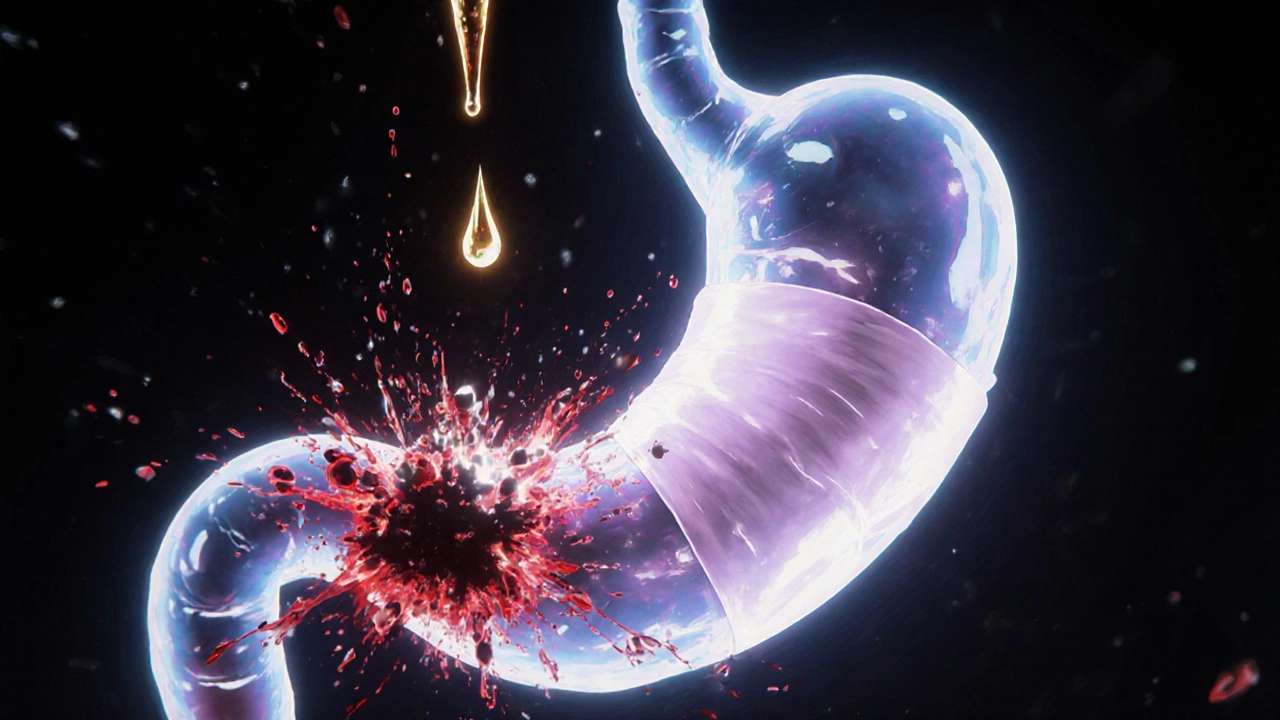

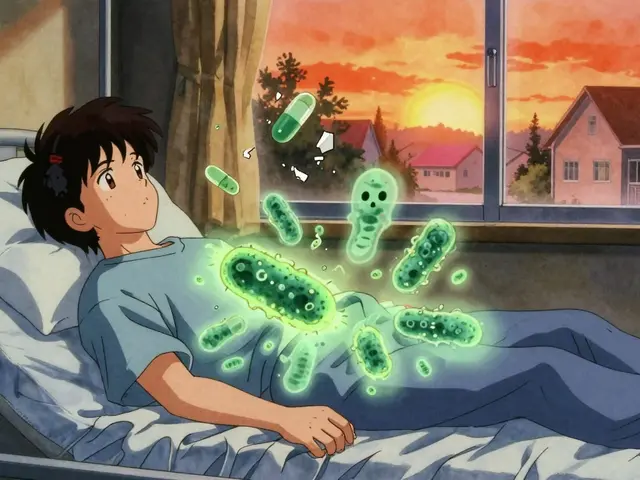
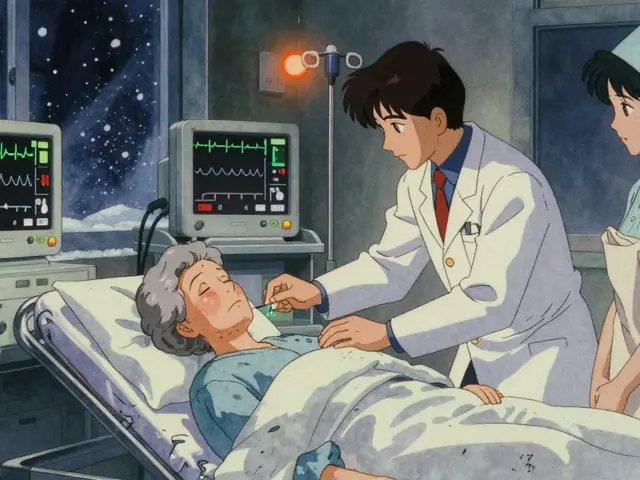
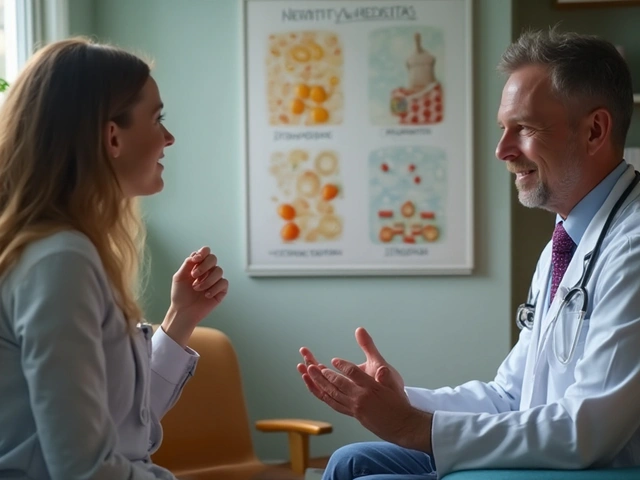


man i just started sucralfate last week and was gonna have a beer with buddies saturday but now i think i’ll skip it. my stomach’s been a mess since last year and i really wanna get this right. thanks for laying it out so clear.
honestly i thought one glass of wine at dinner was fine till i read this. my grandpa had ulcers and he swore by whiskey for 'digestion' but now i see that was just old school nonsense. no more drinks for me until this heals. also non-alcoholic beer is legit good now, tried one last week and it was fine
i had no idea alcohol could mess with healing like that. i thought it was just about getting drunk or liver stuff. so if i have a mocktail with lemon and soda is that okay? i just miss the fizz lol
Alcohol doesn’t 'cancel' sucralfate. It just makes it irrelevant.
you got this!! 💪 honestly the hardest part is the social pressure, but your body will thank you. i quit drinking during my last ulcer treatment and now i don’t even miss it-my skin cleared up, my energy soared, and i slept like a baby. try sparkling water with lime, it feels like a treat. you’re not giving up, you’re upgrading.
my sister was on sucralfate last year and she said the hardest part was not drinking at family dinners. she started bringing her own sparkling water with mint and said people stopped asking her why she wasn't drinking. sometimes it’s just about having something in your hand that looks like a drink. you’re not alone in this.
i just wanna say i totally get it because i was the person who thought 'oh it’s just one drink' and then i ended up back in the ER with bleeding and my doctor looked at me like i’d just kicked a puppy. sucralfate is not a suggestion, it’s your stomach’s last line of defense and alcohol is basically a wrecking ball. i’m 3 months clean now and my digestion is better than it’s been since college. i even started cooking again. your body is trying to heal, don’t sabotage it with 'just one'-it’s never just one, it’s always one too many.
How quaint. You're treating a biochemical process like a moral choice. The fact that you're still taking sucralfate at all suggests you're not yet aware that modern gastroenterology considers it largely obsolete-PPIs and H. pylori eradication are the real standards. But fine, if you want to play the 'stomach bandage' card, at least have the decency to avoid carbonated beverages too. They increase intragastric pressure and undermine mucosal integrity. And yes, I've read the 2023 meta-analysis. You're welcome.
it’s wild how something so simple-stopping a drink-can feel like losing a friend. but your stomach? it’s been holding your hand through every bad decision, every late night, every spicy taco at 2am. now it’s asking for silence. not punishment. just stillness. you don’t have to give up alcohol forever. just for now. let your insides breathe. let them mend. sometimes healing isn’t loud. sometimes it’s just not drinking.